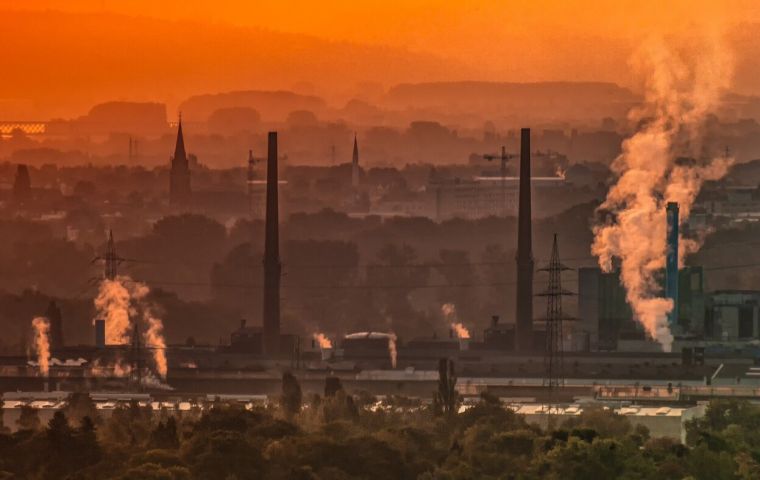MercoPress. South Atlantic News Agency
Billions of people breathe unhealthy levels of fine particulate matter and nitrogen dioxide, WHO report
 A record number of 6000 cities in 117 countries are now monitoring air quality, but the people living in them are still breathing unhealthy levels of pollution
A record number of 6000 cities in 117 countries are now monitoring air quality, but the people living in them are still breathing unhealthy levels of pollution Almost the entire global population (99%) breathes air that exceeds WHO air quality limits and threatens their health. A record number of over 6000 cities in 117 countries are now monitoring air quality, but the people living in them are still breathing unhealthy levels of fine particulate matter and nitrogen dioxide, with people in low and middle-income countries suffering the highest exposures.
The findings have prompted the World Health Organization to highlight the importance of curbing fossil fuel use and taking other tangible steps to reduce air pollution levels.
Released in the lead-up to World Health Day, which this year celebrates the theme Our planet, our health, the 2022 update of the World Health Organization’s air quality database introduces, for the first time, ground measurements of annual mean concentrations of nitrogen dioxide (NO2), a common urban pollutant and precursor of particulate matter and ozone. It also includes measurements of particulate matter with diameters equal or smaller than 10 μm (PM10) or 2.5 μm (PM2.5). Both groups of pollutants originate mainly from human activities related to fossil fuel combustion.
The new air quality database is the most extensive yet in its coverage of air pollution exposure on the ground. Some 2,000 more cities/human settlements are now recording ground monitoring data for particulate matter, PM10 and/or PM2.5, than the last update. This marks an almost 6-fold rise in reporting since the database was launched in 2011.
Meanwhile, the evidence base for the damage air pollution does to the human body has been growing rapidly and points to significant harm caused by even low levels of many air pollutants.
Particulate matter, especially PM2.5, is capable of penetrating deep into the lungs and entering the bloodstream, causing cardiovascular, cerebro-vascular (stroke) and respiratory impacts. There is emerging evidence that particulate matter impacts other organs and causes other diseases as well.
NO2 is associated with respiratory diseases, particularly asthma, leading to respiratory symptoms (such as coughing, wheezing or difficulty breathing), hospital admissions and visits to emergency rooms.
WHO last year revised its Air Quality Guidelines, making them more stringent in an effort to help countries better evaluate the healthiness of their own air.
“Current energy concerns highlight the importance of speeding up the transition to cleaner, healthier energy systems,” said Dr Tedros Adhanom Ghebreyesus, WHO Director-General. “High fossil fuel prices, energy security, and the urgency of addressing the twin health challenges of air pollution and climate change, underscore the pressing need to move faster towards a world that is much less dependent on fossil fuels.”




Top Comments
Disclaimer & comment rulesCommenting for this story is now closed.
If you have a Facebook account, become a fan and comment on our Facebook Page!